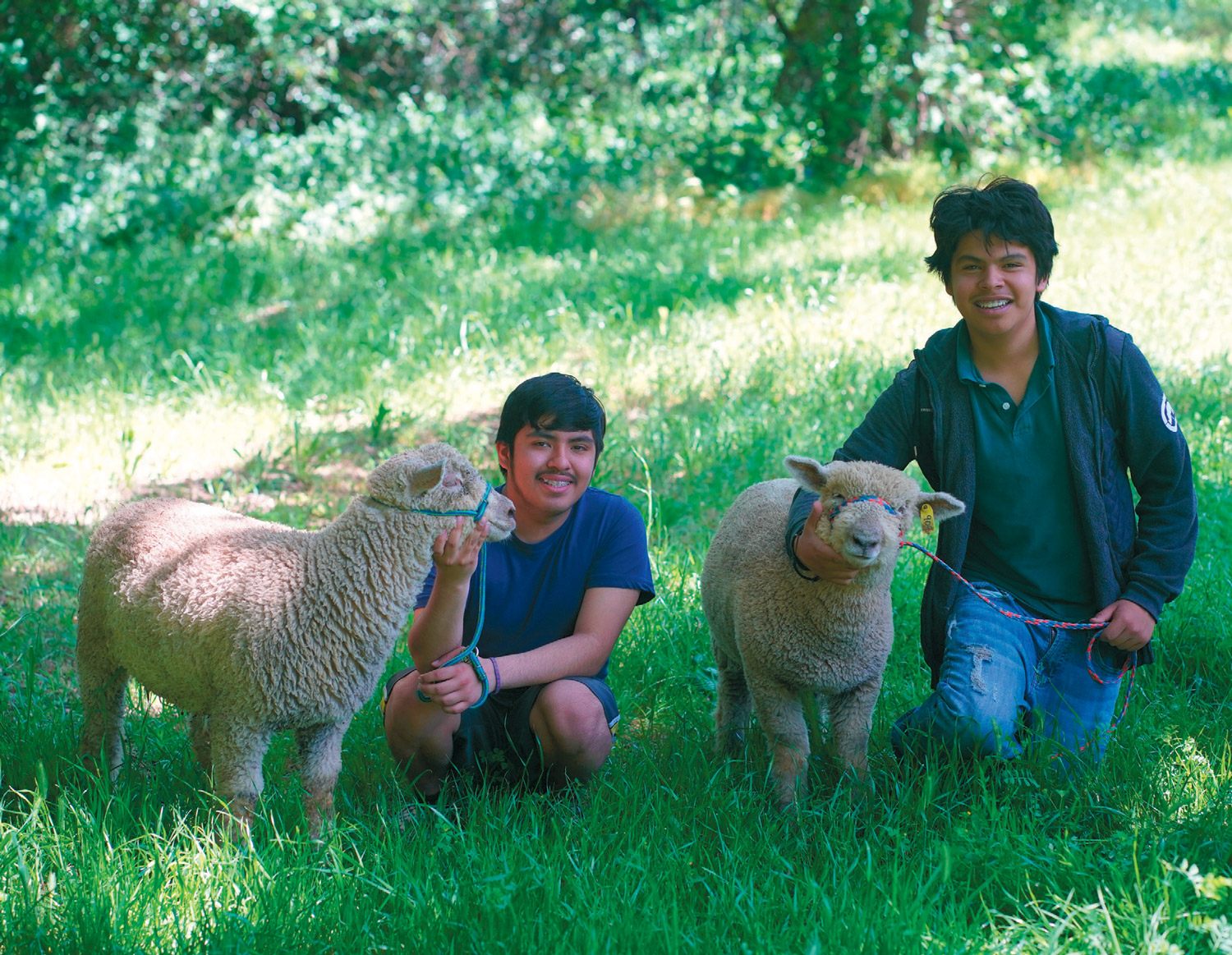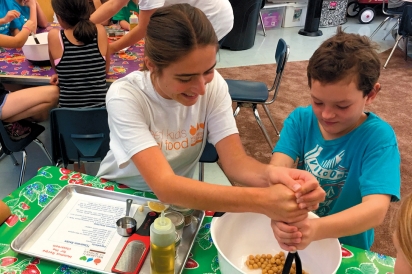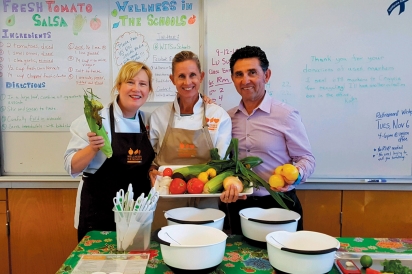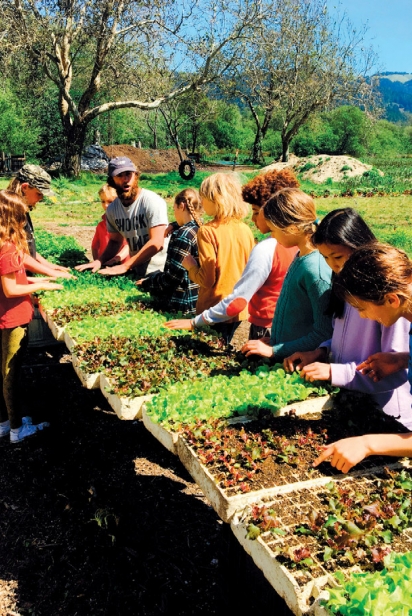Growing Skills
LOCAL ORGANIZATIONS DIG DEEPER TO TEACH OUR YOUTH
“Give a man a fish and you have fed him once. Teach him to fish and you have fed him for a lifetime.” While the exact origin of this ancient precept is highly contested, the value of hands-on learning of life skills towards self-sufficiency still resonates today, especially when studies show that a significant portion of modern youth struggles with access to fresh, nutritious food and lacks an appreciation for how diet affects overall wellness.
Add to these disturbing truths that many young people today do not fully understand where their food comes from, much less how to cook for themselves.
Once, while teaching second graders in a school garden, I pointed to a cucumber growing on a vine and asked them what it was. Many replied confidently, “A pickle.” Even in this region of the proverbial “happy cow,” some still believe that chocolate milk comes from brown cows.
Issues around food access and nutrition awareness might sound surprising here in Edible Marin & Wine Country-land, an area notably blessed with a robust agricultural heritage and present, including a wealth of organically grown produce, grass-fed meat and dairy products, sustainably-farmed shellfish and artisan-made cheeses. And, yes, there are plenty of opportunities for youth to visit a local farm, pet a goat or pick a strawberry. But do these cursory experiences provide a real understanding and appreciation of what it takes to sustainably produce real food, food that nourishes our bodies as well as the planet? And are even these brief encounters available to all who could benefit from them? The answer may be no.
Does that matter? The answer is a resounding yes. Not only will today’s youth someday in the not-too-distant future be responsible for making food choices for themselves and for their own families, many of them will be needed to do the work of feeding others, working in either agricultural or culinary fields. Not to mention the universal task we all must take up of stewarding the planet.
Enter a handful of local organizations that have recognized the need to provide deeper culinary and agriculture education, immersing children and young adults in the farm, field and kitchen. These groups offer opportunities for hands-on learning and real-world training, as well as connections to mentors and positive role models.
CAREER TECHNICAL EDUCATION FOUNDATION, SANTA ROSA
North Bay’s Career Technical Education Foundation (CTE) supports Sonoma County schools and students with real-world skill-building opportunities that enhance or expand traditional career technical education. Amber Figueroa, associate executive director of CTE, says, “By supporting sustainable agriculture and culinary programs specifically, our goal is to broaden awareness of in-demand, high-opportunity careers in the agriculture and culinary industries, while also teaching students about the long-term benefits of supporting our local foodshed and promoting healthy eating habits.”
CTE provided the funding for Sonoma County’s first farm-to-table high school program, at Healdsburg High School, and has since funded similar programs at other schools including Sonoma Valley High School, Petaluma High School and Elsie Allen High School. CTE also provided a three-year grant to the Hanna Boys Center, a school for at-risk youth in Sonoma, to support the launch of their culinary and garden program. Through funding the program at Hanna, CTE says that it hoped to help the students there build life skills; provide opportunities for them to make connections with local industry mentors and employers; and create readiness to enter the agriculture and culinary fields. Currently the agriculture program focuses mainly on sheep husbandry and the students have raised lambs for sale at both the Sonoma County Fair and the Petaluma Fair.
COLLEGE OF MARIN, INDIAN VALLEY CAMPUS, NOVATO
Nestled amongst the bucolic rolling hills on the College of Marin’s Indian Valley Campus, the Indian Valley Organic Farm and Garden is a robust and thriving six-acre “living lab” used in the school’s organic farming, landscaping and food and hospitality curriculum. The farm also produces loads of fresh food.
In 2018, major additions were completed at the farm that increased not only its growing capacity, but also the extent and quality of the education it offers. The construction included a new greenhouse and four new classrooms, one of which is a demonstration kitchen currently supported by Nugget Markets, which owns a market close to campus, as well as the Nugget Markets in Corte Madera and Tiburon, and the Sonoma Market.
For-credit classes offered at the farm cover not only hands-on farming and gardening techniques, but also business skills, landscaping, soil management, irrigation and integrated pest management—all of which are necessary for the operation of a sustainable agricultural endeavor. Students taking these courses can achieve a certificate or associate degree in organic farming and environmental landscaping.
Johnny Campbell, manager of Indian Valley Organic Farm and Garden, says he is most excited about “the expansion of our free summer academies as they expose high school students to career paths with an in-depth look at specific topics. For example, in the Culinary World summer academy, students spend an entire week learning about culinary careers. They will get to see food grown on our farm and then learn how to prepare it at the Nugget Markets Demonstration Kitchen, right next to the farm. This is exciting because students will have an amazing opportunity for an in-depth, hands-on, farm-to-fork training designed specifically for them at College of Marin.” The career academies are open to all Marin County high school students who have completed ninth grade.
AGRICULTURAL INSTITUTE OF MARIN, SAN RAFAEL
Better known as AIM, the Agricultural Institute of Marin operates a handful of certified farmers’ markets in our area, most notably the expansive Thursday and Sunday markets at the Marin Civic Center. But AIM does not “just” operate farmers’ markets—the nonprofit organization is on a mission to directly connect consumers with the people who grow their food.
One of the ways that AIM seeks to do this is through its long-running Diggin’ Education program. Through Diggin’ Education, AIM provides food and farming-related education in the classroom, on the farm and at the market. Andy Naja-Riese, CEO of AIM, says, “Children develop their palates at a young age, so the more we can introduce healthy foods like fruits and vegetables, the more we can inspire a lifetime of healthful, seasonal eating. Children learn best through hands-on experiences, so getting outdoors to meet the farmer at the farmers’ market or see and feel where food is grown on a farm teaches the next generation about health, their environment and the importance of being responsible stewards of the land.”
Recently, AIM partnered with the Novato Unified School District’s (NUSD) Director of Food Service Miguel Villarreal and chefs Cait Olesky and Nancy Larson for the Wellness in the Schools program (WITS). Through WITS, 3,500 K–8 students from the NUSD participate in cooking and nutrition labs, learning basic age-appropriate culinary skills. The program also seeks to familiarize students with menu items served in the NUSD’s cafeterias so they overcome the fear of trying new foods and learn the value of eating seasonal and locally grown produce.
With 37% of NUSD’s students qualifying for free or reduced-cost lunches, the overreaching goal of the WITS program is to trigger a ripple effect where students take home their new knowledge and share recipes, nutrition and health facts with their families, their community and beyond.
Villarreal says, “We have seen many positive results due to our approach of connecting the 3 C’s: cafeteria, classroom and community. For instance, we have seen an increase in consumption of all the food products that were used in the culinary classes, such as fresh spinach, fresh kale and beans. Many students have shared with us that they have never tried many of the foods that we have introduced to them. These culinary classes also address a much broader issue: equity and food justice for all students. All our students are taught wellness life skills, regardless of socioeconomic status. Having the opportunity to eat healthy food is a right, not a privilege.”
Editor’s Note: In early April, NUSD reversed its decade-long policy banning red meat from the school lunch program (prompted by a large-scale beef recall in 2008) with a new sourcing partnership with Marin grass-fed beef producer Stemple Creek Ranch. Loren and Lisa Poncia, owners of Stemple Creek Ranch, are the fourth generation of their family to work the land on their Tomales Bay ranch. The couple has two daughters who attend NUSD schools. “The day I saw Stemple Creek beef on my kids’ school lunch menu was a very happy and very proud day in my life as a farmer and as a dad. Grass-fed beef means that kids, parents and school staff can enjoy superior protein from animals that never, ever, see a feedlot, are raised on open pastures and exemplify the care for the land that I want to pass on to the next generation,” said Loren Poncia.
AgriculturalInstitute.org/farm-based-education
CULTIVATING A HEALTHY FUTURE
If lasting and positive changes are to occur in our food system and the overall health of human beings, and the planet, these positive shift s in how we teach the coming generations must continue. Hopefully even more programs like these will emerge. As Johnny Campbell, manager of the College of Marin’s Indian Valley Organic Farm and Garden, puts it, “Culinary and agriculture education are more important now than ever because of the incredible value these skills have when taught to our youth. A sustainable food system is about more than just good food. It means healthy students, a healthy environment and healthy communities. We know that what we put into our bodies affects our quality of life, our success and more—so starting at a young age with education on good, healthy cooking is a great way to set students up for success throughout their lives.”








